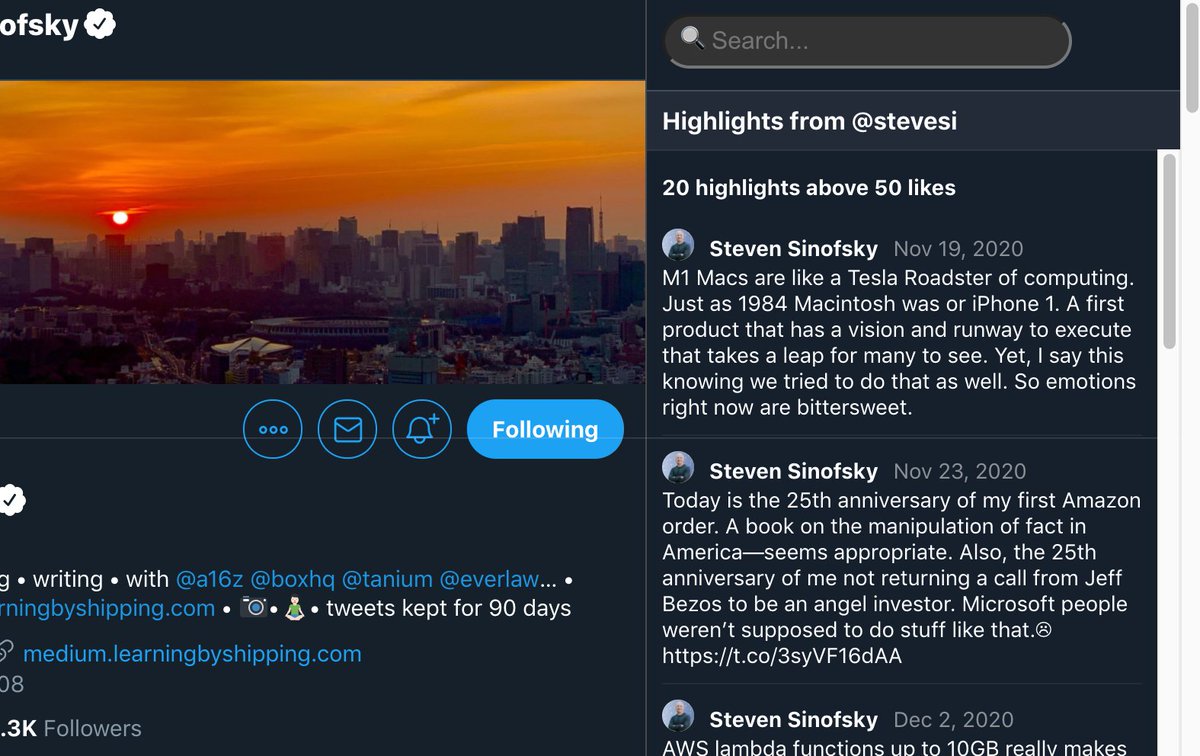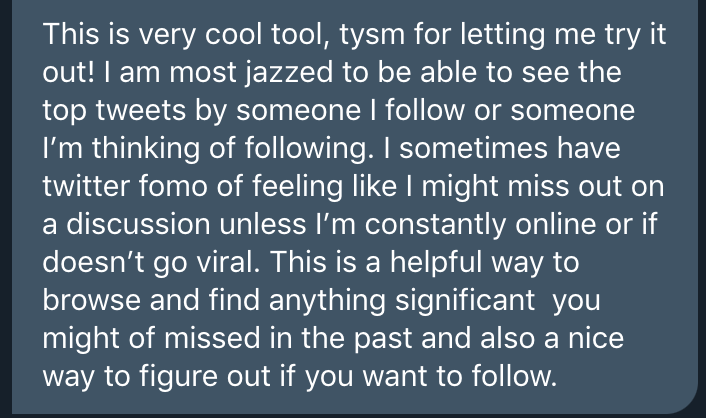
It's been a fun year working on ways to give end users more agency over their software 🤓
Reflecting on 2020, 3 ideas I'm excited about in this space:
⚙️ Browser extensions: still underrated
🧮 Spreadsheets in more places
🔃 Interop is everything
Details in thread:
Reflecting on 2020, 3 ideas I'm excited about in this space:
⚙️ Browser extensions: still underrated
🧮 Spreadsheets in more places
🔃 Interop is everything
Details in thread:
1) ⚙️ Browser extensions
One of the main computing platforms of our time allows us to install wide-ranging modifications. This is a big deal and we don't talk enough about it.
I think we are just scratching the surface of what is possible with browser extensions.
One of the main computing platforms of our time allows us to install wide-ranging modifications. This is a big deal and we don't talk enough about it.
I think we are just scratching the surface of what is possible with browser extensions.
Recently I've been hacking on a Twitter extension, and it's reminded me how awesome extensions are.
It feels SO empowering! I just spent a few days adding features I wanted for myself, and now can ship them for others to use too ☺️
It feels SO empowering! I just spent a few days adding features I wanted for myself, and now can ship them for others to use too ☺️
https://twitter.com/geoffreylitt/status/1338212261282897921
Still, there's a big problem w/ extensions: how damn hard it is to make them. Requires web dev skills, and tricky integration work. Programmer Elite territory.
In 2019, I wrote about this problem and started thinking about it a lot:
geoffreylitt.com/2019/07/29/bro…
In 2019, I wrote about this problem and started thinking about it a lot:
geoffreylitt.com/2019/07/29/bro…
Can you imagine a world where building a "browser extension" was just a routine part of using the web?
Doesn't have to be majority of people doing it. If even 10% of web users made extensions, there would be a total explosion of creativity!!!
Which brings me to the next point:
Doesn't have to be majority of people doing it. If even 10% of web users made extensions, there would be a total explosion of creativity!!!
Which brings me to the next point:
2) 🧮 Spreadsheets everywhere
One of the main prompts I explored this year was:
"What if you could build a browser extension in a spreadsheet?" 🤔
Built a prototype called Wildcard, turned out the idea had some legs.
One of the main prompts I explored this year was:
"What if you could build a browser extension in a spreadsheet?" 🤔
Built a prototype called Wildcard, turned out the idea had some legs.
Had a lot of fun exploring the limits of this model. Turns out a basic formula language and simple sorting operators can take you reasonably far:
https://twitter.com/geoffreylitt/status/1231962052727582726
I had hoped to ship a nice usable beta this year, but alas didn't achieve that goal. Making a research prototype "real" is hard work, not incentivized by academia.
But, still working w/ some other students to add some exciting new features to Wildcard, so stay tuned...
But, still working w/ some other students to add some exciting new features to Wildcard, so stay tuned...
And by the way, there is still so room to apply the spreadsheet model in many other contexts.
This has many potential meanings depending on what parts of spreadsheets you choose to keep/discard. Airtable & cousins are just one model to follow...
This has many potential meanings depending on what parts of spreadsheets you choose to keep/discard. Airtable & cousins are just one model to follow...
3) 🔃 Interop is everything
I'm increasingly convinced that interoperability is one of the great unsolved problems in software customization.
So much software today is networked. Agency and choice is great, but my app still needs to talk to your app somehow.
I'm increasingly convinced that interoperability is one of the great unsolved problems in software customization.
So much software today is networked. Agency and choice is great, but my app still needs to talk to your app somehow.
Open standards are great. We shouldn't take for granted our ability to choose our preferred email clients--who knows how long that will last.
But open standards move slowly and often lose to closed competitors. Also, sometimes hard to flexibly extend with new features.
But open standards move slowly and often lose to closed competitors. Also, sometimes hard to flexibly extend with new features.
So I wonder: can we find ways to create looser standards? Something halfway between a formal open standard, and islands of isolated functionality.
That would allow us to mod our software but still collaborate with each other.
That would allow us to mod our software but still collaborate with each other.
Over the summer I explored this question w/ collaborators at Ink and Switch on the Cambria project.
We built a prototype system based on declarative bidirectional lenses. Still early, but I think we found some promising directions...
We built a prototype system based on declarative bidirectional lenses. Still early, but I think we found some promising directions...
https://twitter.com/geoffreylitt/status/1313530745273679872
One fascinating thing we noticed is that "evolving datatypes" is a monster problem. Doesn't just show up in cross-app compatibility, but also database migrations, API versioning...
I'm now convinced this is a whole category where devs need much better tools.
I'm now convinced this is a whole category where devs need much better tools.
Alright that's it for the reflection!
Looking forward to going deeper on these themes in 2021 and continuing to pursue the elusive end-user programming dream.
I have some new ideas for a deeply customizable software toolkit which I'm excited to share more about soon... 🎄
Looking forward to going deeper on these themes in 2021 and continuing to pursue the elusive end-user programming dream.
I have some new ideas for a deeply customizable software toolkit which I'm excited to share more about soon... 🎄
• • •
Missing some Tweet in this thread? You can try to
force a refresh













